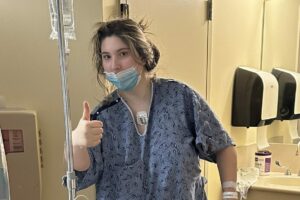In February 2023, Gerry shared his family’s serious challenges with blood clots. He’s now updating it to reflect significant new results from the genetic research project his family is doing with Yale Smilow Cancer Center. Gerry’s presented his family’s story to five Senate/House committee staff as part of Capitol Hill Day on March 6, 2024 . These results are important to Gerry’s family and potentially to thrombophilia genetic research.
My family’s blood clot history begins as a grim story, but it has now become a story of inspiration and hope.
Blood clots have tragically affected my family for many generations. Five of my closest relatives have had blood clot conditions. Two of us have survived, but we have lost three loved ones (my father at age 54, my brother at age 55 and my nephew at age 36).
Half of the million annual blood clot cases are inherited, and half are acquired. It is clear that thrombosis runs in our family through some genetic disorder. Most of our family have been tested repeatedly for the five to 10 most common genetic abnormalities known to cause clots. But all the test results came back negative. So the causes of our family’s blood clot problems remained unknown –until about six months ago.
Following my nephew’s memorial service in May 2021, I began a quest to locate medical experts who could find the causes of our family blood clot challenges. I connected with Dr. Alfred Lee, director of hematology at Yale Smilow Cancer Center, a well-respected leader in thrombosis research and a wonderful human being.
Dr. Lee tested me using state-of-the art whole exome genetic sequencing, which identifies a much larger range of genetic risk factors than the standard clinical panel. The tests revealed that I carry a previously unknown mutation in the SERPINC1 gene that encodes the antithrombin protein that controls clotting. This was an exciting potential break-through.
Next, Dr. Lee’s team organized a research project to test which of my blood relatives had the same SERPINC1 mutation and whether there was a correlation of the gene mutation and the occurrence of thrombosis. All key family members were tested in spring 2023. The results came back in September-2023 — and they are dramatic.
Most of my family members carry the SERPINC1 mutation. Those family members with thrombosis were found to have the mutation. Three family members with no history of thrombosis were also found to have the mutation. All affected family members are now working with their treating physicians on prevention and treatment plans. I am continuing my successful anticoagulant treatment with the Yale Heart and Vascular Coumadin Clinic. Our Yale research team has started phase three of the family research project to determine the significance of these findings.
My family is committed to doing everything we can to reduce blood clot disorders so that other families do not have to suffer what we have endured over the last 60 years. We are so glad to have joined the National Blood Clot Alliance, an organization full of people who are facing their own challenges with blood clot disorders — and transforming suffering into practical and powerful action.
We applaud NBCA’s focus on the fundamentals of patient and caregiver and provider education. Our family is understandably focused on the genetic factors driving hereditary thrombosis and more generally on the needs of families with multiple blood clot cases.
MORE INFORMATION AND RESOURCES:
- Read our Patient Guide to Accessing and Understanding Clinical Trials to learn how to get involved with research.
- Learn about our Council of Emerging Researchers in Thrombosis (CERT)
- Join our online peer support community to connect with other people who have experienced a blood clot.
- Learn more about blood clot risk factors, signs and symptoms, and prevention.
- Read more stories or share your story with NBCA.




